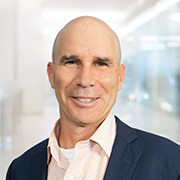Guests: Kip Meintzer, Global Head of Investor Relations, Check Point Software
Host: Shaul Eyal, Managing Director, Communications, Security and Infrastructure Software Research Analyst, TD Cowen
TD Cowen analyst Shaul Eyal speaks with Check Point Software's Kip Meintzer, Global Head of IR from the TD Cowen 53rd Annual Technology, Media & Telecom Conference about the company's renewed momentum and solid market trends as the company is quickly moving to regain market share. The combination of a recently incoming CEO with a strong venture capital and operational background and a large Technical Account Management opportunity should enable the company to revert to double digit growth rate longer term.
A healthy cash position is being utilized to broaden the company's security platform through tuck-in acquisitions and a clockwork buyback plan is viewed favorably as good cash utilization. The shift to adopt hybrid security platforms, rise of GenAI, compliance and regulation as well as a current firewall refresh cycle is providing the industry and the company with the necessary visible growth drivers keeping us positive on the shares.
This podcast was recorded on May 28, 2025
Speaker 1:
Welcome to TD Cowan Insights, a space that brings leading thinkers together to share insights and ideas shaping the world around us. Join us as we converse with the top minds who are influencing our global sectors.
Shaul Eyal:
This is Shaul Eyal, TD Cowan Cyber Security research Analyst. We are joined by Kip Meintzer, Checkpoint Software's global head of IR. Kip, great to see you. Thanks for joining our podcast.
Kip Meintzer:
Thank you, Shaul, for having me. It's been looking forward to this.
Shaul Eyal:
Always a pleasure. I want to start with a big picture topic, which is the macro and its potential impact on security spending. On the one hand, almost every other security company reporting quarterly results thus far is indicating solid security environment. And on the other hand, many have taken a more prudently, I should say, conservative views towards second quarter and second half views. What is the disconnect or interest relations between solid performance and guarded views?
Kip Meintzer:
Interesting. So if I look back at our first quarter, we had solid performance. However, Liberation Day didn't come till April 1st, so that was the beginning of the second quarter. All indications we saw we were going to have a nice second quarter, and I still believe we have that feeling. Unfortunately, you don't know how the end of the quarter is going to finish. And since Liberation Day happened on April 1st and we had our earnings on April 23rd, we thought it was prudent to take a little consideration that there could be push deals or it could be some macro impact in that aspect for us, and I can't speak for the other companies, but we continue to see a building second half of the year. So from a macro standpoint, we don't see that impact from a security standpoint. Other industries might be impacted in a different way. We look at security as a little bit insulated, not immune, but a little bit insulated. So I think going forward, I think it just depends on what industry you're in and if you're feeling some impact or not. As I said, when we gave our earnings announcement, we hadn't felt any impact yet.
Shaul Eyal:
Focusing on the network security arena, we are in the midst of a refresh cycle. What is driving customers to refresh their firewall hardware appliances, and how long do we see this cycle as persisting?
Kip Meintzer:
So I think there's a couple drivers. One, you have end of life of some of the boxes. You had folks sweat their boxes last year, or I guess it was '23, they sweated their boxes. '24, they sweated their boxes when the Fed played a little bit with the interest rates, led people to believe there might be a recession coming and who knows, there still might be a recession coming. But I think that resulted in some behavior that maybe pushed some of the refresh out last year.
We started to see it hot and heavy in the first quarter, obviously, and we expect it to continue probably through the first half of next year. And if you take into consideration our competitors refreshes that are going on, and one in particular has talked about a very large one, I think we'll participate in theirs also with our new boxes. And we actually are launching some new boxes today, some management appliances. So we continue to refresh all of the lines and I think that's to our advantage.
Shaul Eyal:
The shift to adopt a platform rather than point solutions have been noticeable over the past several years and it's positively impacting Checkpoint. In Checkpoint's case, we have seen Infinity platform performing well, already accounting for almost 20% of revenues. What's behind customer's shift to adopt a platformization approach? Is it the agility? Is it the flexibility? Is it the pricing? Is it all of the above?
Kip Meintzer:
Actually the platformization word, that's a made-up word and it goes along with a made-up strategy. It has nothing to do with a platform. So when we talk about a platform, we're talking about a pre-integrated solution. So you as a customer don't have to go get an SI to do all this customized integration. Something that harkens back to the enterprise software day where you used to pick best in breed and then have one of the SIs, the global SIs come in and use middleware to make it all work. Every time you upgrade a package, it breaks and you spend a lot more money with the GSIs.
That's going to be true with anybody in security that does that same type of approach. We take a different approach. We started the integration back in the mid 2010, 2012 timeframe, and we delivered Infinity in 2018. However, nobody really cared because people weren't ready for a platform at that point in time.
So we continued to build out that platform, do more integration. We're still doing that today. We announced the Verity acquisition yesterday, and so we continue to build on that integrated platform. And our approach is to do prevention and protection above all else, right? It's delivering a comprehensive solution and customers can take as much of it or as little of it as they like. And for Infinity, really it's about having more than one SKU of our product. That's where you get an Infinity platform. So today we have very low penetration. We look to have high penetration in the future. Today it makes up a little over 15% of our revenues.
Shaul Eyal:
Nadav Zafrir joined us Checkpoint's new CEO late last year. He comes with a strong VC background with a great list of industry contacts across the board, across the globe. He has been certainly preaching checkpoints, hybrid mesh platform. I know it's early days, but how has that been unfolding so far?
Kip Meintzer:
Well, I think as an addition to Checkpoint, Nadav was just what, it was like a shot in the arm. The company's enthusiasm, exuberance, there's a whole new energy. It was almost like giving another life to Checkpoint, bringing him on and watching it boil up inside of the company, the enthusiasm. I think you can see his marks already starting to be left on the company from the standpoint of we just did the Verity acquisition that I spoke about earlier. We announced that yesterday, and you look at the Whiz relationship that we have.
All of these things have the hallmark of Nadav, and I think you'll see a lot more to come from that standpoint, but I think it's early days. We're grinding it out right now. You don't move the yacht 180 degrees overnight. It's something that's going to take time. And so as we go through this year, I think you'll see more and more progress being made.
Shaul Eyal:
You mentioned a very, very interesting point, and this is the Whiz partnership. Since Nadav has joined, as we all know, Whiz has been acquired by Google for $32 billion. This transaction is still in process, likely to close next year. But I wanted to ask specifically about the CNAP partnership. How is that partnership structured? Because Checkpoint has its own CNAP and Sweden product.
Kip Meintzer:
I can only speak to what we've made public. When you look at our CNAP product, actually, you look at anybody's CNAP product, it was losing to Whiz across the board. They have a unique product and they're doing very, very well. We saw that and we saw an opportunity from Nadav's open garden approach to embrace it fully with Whiz. And so as a result of that, we announced that relationship. As far as the Google aspect, we don't expect anything to change. We haven't seen any indication. Probably to the contrary, it's been full speed ahead with the integration. I like to joke, daddy's got a bigger pocketbook, right?
So from that standpoint, we see it as full steam ahead. In the industry, we saw it as much, much more beneficial to us because we could bring them in, we can provide the protection prevention while they provide the observability, and this creates a great relationship with them integrated into the platform. It's a very nice harmonious relationship.
And so what that'll allow them to do is drag us into deals when it comes to firewall because of the integration, it'll make it more attractive for their product as well as ours. And then for our existing customers, they have a period of time where they can make the transition. Remember CNAP for us was low, tens of millions of dollars, very low, tens of millions, and so the first year we're whole. And then you'll see it just fade off into the sunset over the next year or two or three.
Shaul Eyal:
Checkpoint's go to market strategy and approach also been much more noticeable over the past two to three years. What are some of the steps that the sales leadership has been taking and executing with customers in that respect?
Kip Meintzer:
Well, I think if you look back as far as 18 to 24 months ago when Francisco Criado, our head of channels came on board, he was a nice shot in the arm also. And he brought I think a lot of enthusiasm on that side of the house. And they started out by doubling deal registration, increasing it by a hundred percent, and really built a more familiarity with our channel. I think it's been actually a compounded by Nadav coming on board and getting out there and meeting all the channel. There's free, let's see, free education, free training, free certification. Whereas in the past, there was always costs associated with that type of interaction with the channel.
That's no longer so that, as it should be. Should be free to them so they can actually get out there and sell our product and support it in a much more effective manner. I think taking out all of the red tape that used to be there for Checkpoint or pink tape, however you want to look at it, I think it has been one of the key areas on the go-to market. And then just increasing that relationship, that touch, doing things like deal bounties for our competitive displacements, things along that lines. I like to say that we're doing to our competitors what they did to us in the early days. So I think if you look going forward, you're going to see a lot more of this, a lot more creativity, and you'll see a lot more salespeople probably in the future also.
Shaul Eyal:
Let's talk about Checkpoint's, M&A strategy. In recent years, I know you've mentioned Verity, but we've seen the company deploying its strong cash position, acquiring assets and email, cloud security. As you've indicated yesterday, you've acquired Verity. That's on the exposure management front. Talk to us about Checkpoint's M&A philosophy, build versus buy in that regards.
Kip Meintzer:
So it's always a time to market issue for us. So where we think we have enough time to do it internally, we do do it internally, and then there's the complimentary buy and build, buying these pieces that complete something that otherwise would've taken much longer to build out as a complete offering. And so I think when you look at it, it really comes down to one thing. Time to market. Does the technology meet our criteria for protection prevention? We're not looking to do detection and remediation. That's whack-a-mole. We'll leave that to our competitors.
What we're focused on is purely protection and prevention. So when we find startups that meet that criterion and have an offering that is very, very complimentary to what we're doing, that's where we start to look at it. And if it makes sense then, and also it comes down to valuation also, right? In the end, you could have something that's a great product, but you want too much for it, or the market won't support the price. So I think for us, it really comes down to finding the right companies, the right technology, and something that's harmonious, people that are going to fit in. When you look at-
Shaul Eyal:
Verity.
Kip Meintzer:
Well, Verity, but if you also look at Avanon, that's a perfect example. We have a person in Gil Friedrich who was the founder of Avanon. He's been with us now four years, three and a half, four years. We acquired Avanon and he's led up the whole email security part of our business. And he delivered, I believe it's, I want to say 600% growth or something along that line since we've had it. So today it's north of 120 million in ARR, and we have a goal of over 200 in the coming year.
He's going to be heading up our workforce, which is what we call all our end user products. That's email security endpoint, et cetera. And he's going to be driving that whole part of the platform. And so we expect great things from him, but there's an entrepreneur who could go out and with a presentation from VCs, they'd back him with as much money as he needed. And I think he's already got enough money. He wouldn't even need the VCs if he wanted to. But I think that's the kind of culture Checkpoint engenders now, especially now that we have Nadav on board.
Shaul Eyal:
When we think about Checkpoint's long-term direction, we have always argued that the core growth could be found by combining its product and subscriptions growth rates, which is currently in the low teens. Is that the right way to assess Checkpoint's core business longer term? And is this where management is heading towards?
Kip Meintzer:
I think when you look at product and subscription, that really captures the bulk of our growing revenues. We do have IGS, Infinity Global Services that's now part of our support, updates and maintenance line, and that's growing very quickly also. That'll probably be, we hope it'll be a contributor in the future more than it is already today.
But when you look at the overall business, the strength is really going to come from the subscription line. As we start to see Workforce, which is really Harmony, all those user-based technologies really start to contribute along with SASE, along with all the cloud-based products. That's where you're going to see the ultimate growth really stem from. And that's what the hybrid mesh network is going to drive., a.
Ll of those attached products. And think about it, today, most of our customers have firewall. So when you look across the board, what we're trying to do with Infinity is get them to take additional SKUs, etc. So as we start to see them take on more of the subscription services, whether it be Workforce, which is Harmony or CloudGuard, that's where we'll start to see more and more growth in that subscription line.
Shaul Eyal:
Kip, thank you so much for joining us. Appreciate it.
Kip Meintzer:
My pleasure. Always something I look forward to.
Speaker 1:
Thanks for joining us. Stay tuned for the next episode of TD Cowan Insights.
This podcast should not be copied, distributed, published or reproduced, in whole or in part. The information contained in this recording was obtained from publicly available sources, has not been independently verified by TD Securities, may not be current, and TD Securities has no obligation to provide any updates or changes. All price references and market forecasts are as of the date of recording. The views and opinions expressed in this podcast are not necessarily those of TD Securities and may differ from the views and opinions of other departments or divisions of TD Securities and its affiliates. TD Securities is not providing any financial, economic, legal, accounting, or tax advice or recommendations in this podcast. The information contained in this podcast does not constitute investment advice or an offer to buy or sell securities or any other product and should not be relied upon to evaluate any potential transaction. Neither TD Securities nor any of its affiliates makes any representation or warranty, express or implied, as to the accuracy or completeness of the statements or any information contained in this podcast and any liability therefore (including in respect of direct, indirect or consequential loss or damage) is expressly disclaimed.

Managing Director, Communications, Security, and Infrastructure Software Research Analyst, TD Cowen

Shaul Eyal
Managing Director, Communications, Security, and Infrastructure Software Research Analyst, TD Cowen

Shaul Eyal
Managing Director, Communications, Security, and Infrastructure Software Research Analyst, TD Cowen
Shaul Eyal is Managing Director and Senior Analyst covering the Communications, Security, and Infrastructure Software sectors and is one of Wall Street’s leading experts in those spaces. He started his equity research career at Oppenheimer & Co. covering Israeli technology related equities and expanded his research focus to cover the security and communication software universes.
Shaul holds an M.B.A. from Fordham University and an LL.B with honors from Oxford Brookes University. He served for five years in the Special Forces of the Israeli Defense Forces, where he held the rank of Lieutenant.



 Japan
Japan






